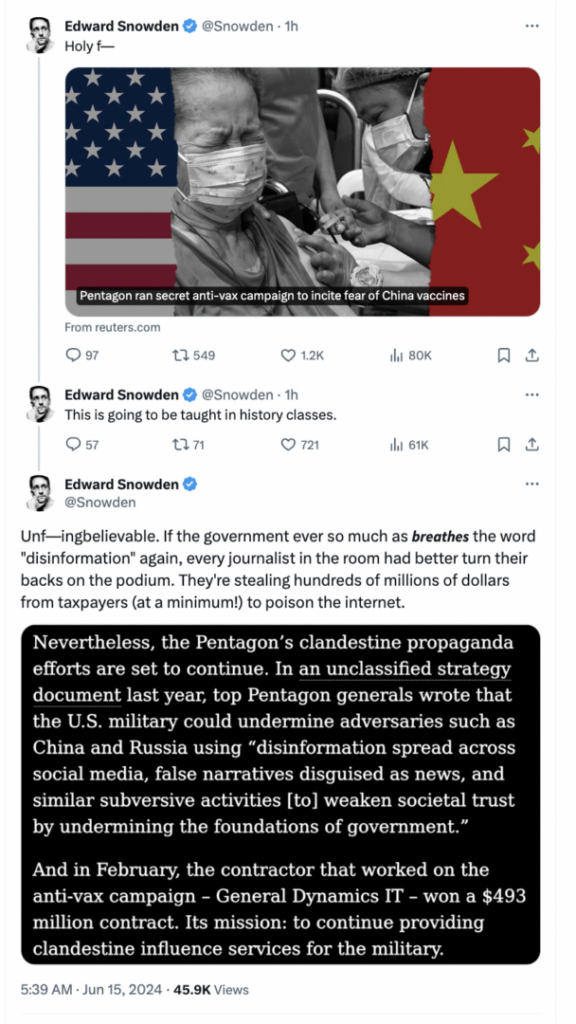Editor's note: This story has been updated with additional details
A recent Reuters report revealed that the U.S. military was involved in a covert operation to counter China’s influence in the Philippines during the COVID-19 pandemic. The operation involved the creation of fake social media accounts to spread doubt about the safety of China’s aid, including vaccines.
What Happened: Renowned whistleblower and privacy advocate Edward Snowden on his social media reacted to the investigation report published on Friday. The report revealed a clandestine operation initiated by the U.S. military at the height of the COVID-19 pandemic. The operation was aimed at countering China’s growing influence in the Philippines, a country severely affected by the virus.
“This is going to be taught in history classes,” Snowden said.
“They’re stealing hundreds of millions of dollars from taxpayers (at a minimum!) to poison the internet,” he added.

The secret campaign involved spreading doubt about the safety and efficacy of vaccines and other life-saving aid supplied by China. The military used fake internet accounts to impersonate Filipinos and launch an anti-vax campaign. The posts criticized the quality of face masks, test kits, and China’s Sinovac vaccine.
The Pentagon is yet to respond to the queries sent by Benzinga at the time of publishing.
Reuters identified at least 300 accounts on X, formerly Twitter, that matched descriptions shared by former U.S. military officials familiar with the operation. The accounts were created in the summer of 2020 and centered on the slogan #Chinaangvirus – Tagalog for ‘China is the virus.’
After the publication approached X about the accounts, the social media company removed the profiles, determining they were part of a coordinated bot campaign.
The U.S. military’s anti-vax effort began in the spring of 2020 and continued into Joe Biden's presidency, even after social media executives warned the new administration about the Pentagon’s misinformation campaign. The Biden White House issued a ban on the anti-vax effort in spring 2021, and the Pentagon initiated an internal review.
"I don't think it's defensible. I'm extremely dismayed, disappointed and disillusioned to hear that the U.S. government would do that," said Daniel Lucey, an infectious disease specialist at Dartmouth's Geisel School of Medicine.
The U.S. military is prohibited from targeting Americans with propaganda, and Reuters found no evidence that the Pentagon’s influence operation did so.
A senior Defense Department official acknowledged the U.S. military’s secret propaganda campaign but declined to provide further details. A Pentagon spokeswoman said the U.S. military uses various platforms, including social media, to counter malign influence attacks aimed at the U.S., allies, and partners.
Why It Matters: This revelation comes amid ongoing tensions between the U.S. and China over the origins of the COVID-19 virus. In March last year, China criticized the U.S. for suggesting that the virus could have leaked from a Chinese lab in Wuhan, accusing the U.S. of politicizing the virus’s origins and damaging its own credibility.
Earlier this month, Dr. Anthony Fauci, the former top U.S. infectious disease expert, testifying before the House Oversight and Accountability Select Subcommittee on the Coronavirus Pandemic, denied allegations of suppressing the lab-leak theory and maintained his belief in animal-to-human transmission as the most likely cause of the pandemic.
Photo by kovop58 on Shutterstock
This story was generated using Benzinga Neuro and edited by Pooja Rajkumari
© 2024 Benzinga.com. Benzinga does not provide investment advice. All rights reserved.
Comments
Trade confidently with insights and alerts from analyst ratings, free reports and breaking news that affects the stocks you care about.